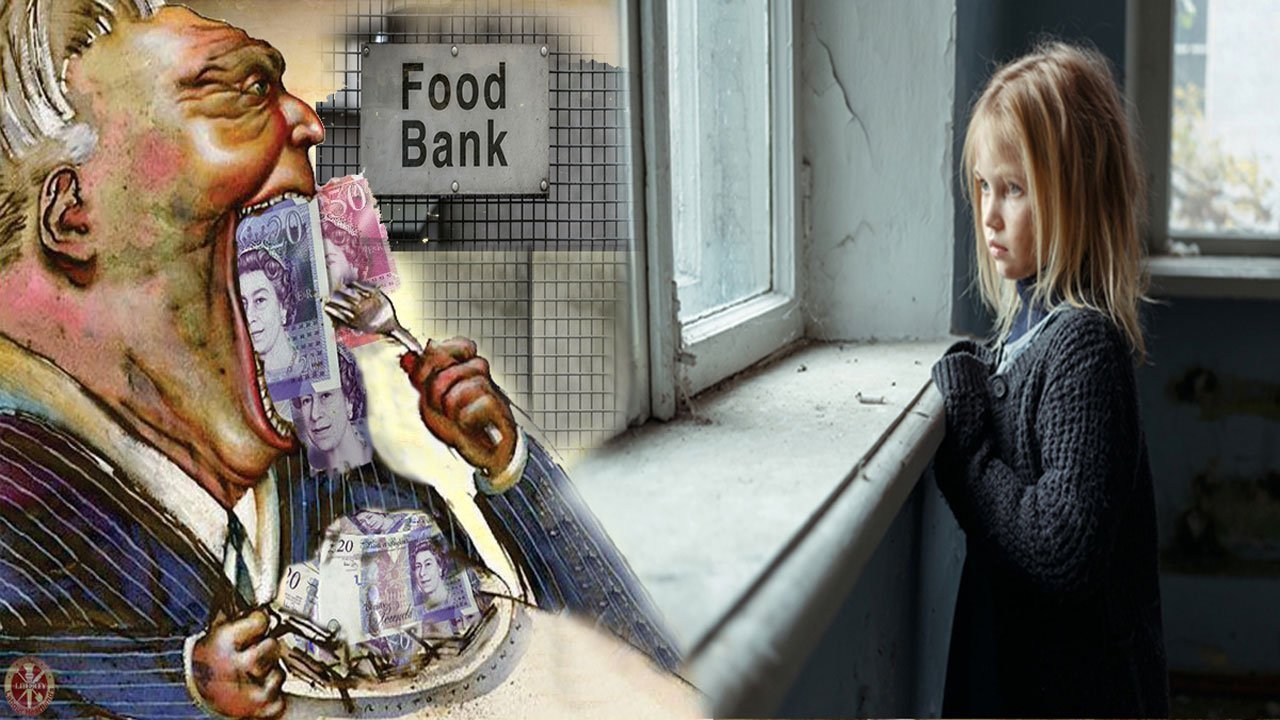
The Emperor’s New Clothes: Starmer’s Hollow Vision for Economic Growth Just Another Housing Gamble
As the King’s Speech fades into the ether, echoing off Westminster’s crumbling walls, one word lingers like a bad smell: “growth.” Sir Keir Starmer’s government chants it with the fervour of snake-oil salesmen, as if mere repetition could conjure economic miracles. But strip away the glossy veneer, beneath the slogans and platitudes lies a stark reality: a government seemingly bereft of substantial policies. It’s reminiscent of the tale of the emperor’s new clothes – all pomp, no substance.
At the heart of Labour’s plan lies a misguided faith in deregulation and private sector magic. The Planning and Infrastructure Bill and the English Devolution Bill – Starmer’s twin towers of economic strategy – are built on the flood plains of England, no doubt the first places to have planning permission passed. Their grand plan? Deregulate the housing market and let private developers run amok, supposedly creating 1.5 million homes.
Have we learned nothing from the wreckage of Ireland’s Celtic Tiger or Turkey’s boom-and-bust fiasco? Never mind the financial crash of 2007, apparently not.
The government’s housing plans include a presumption in favour of development and new powers to overrule local objections on national infrastructure projects. Critics argue this is “shameless spin,” particularly regarding the reclassification of “green belt land” as “grey belt” to permit building on previously protected areas. While we all agree more houses are indeed needed, they should be built in appropriate locations, such as brownfield sites in city centres.
We’re force-fed the risible concept of “grey belt” land – a euphemism so transparent it’s just doublespeak. This brazen attempt to concrete over our green spaces isn’t just environmentally reckless; it’s political suicide on a local level. Even Labour MPs will baulk when the bulldozers roll into their constituents’ backyards.
This obsession with private home ownership isn’t new. As Tony Benn astutely observed, “You can buy your council house, so you’ll be a property owner, you may not be able to get a wage increase, but you can borrow’. And the borrowing was deliberately encouraged because people in debt are slaves to their employers.” Starmer’s Labour, it seems, is all too eager to continue this insidious tradition of debt-based control.
The missed opportunities in Starmer’s housing plan are truly staggering, enough to make even the most cynical observer wince. Rather than deregulating and kowtowing to private developers, a bold government-led initiative to construct 1.5 million council homes could have been transformative. Such a project would not only provide stable, affordable housing but also stimulate the economy, create jobs, and reduce dependency on the volatile private sector.
But alas, such visionary thinking is as rare to Starmer’s Labour as a Toolmaker’s son from Oxbridge. We will leave that to the Atlee’s of the past when Labour had values. Instead, we’re offered a reheated serving of neoliberal dogma, garnished with a sprinkling of false hope.
As average house prices hurtle past the £300,000 mark, the notion that unleashing profit-hungry developers will somehow make properties more affordable is a fantasy worthy of Lewis Carroll. It’s a pipe dream that conveniently ignores the lessons of history and the basics of market dynamics.
But perhaps that’s the point. Keep the masses chasing the mirage of homeownership, keep them saddled with crushing debt, keep them too preoccupied with survival to question the system. It’s a strategy as old as time, dressed up in the emperor’s new clothes of “economic growth” and “opportunity”.
In this grand charade, Starmer’s Labour reveals itself not as the party of the people, but as the party of the status quo, content to fiddle with the dials of a broken machine rather than dare to imagine a new one. The tragedy is not just in the homes not built, but in the future not envisioned.

Immigration and Labour
The Labour Paradox: Immigration, Housing, and Fiscal Policy
Labour’s approach to immigration and fiscal policy reveals a troubling contradiction at the heart of their agenda. On one hand, they’ve delayed introducing major legal changes to limit foreign labour until the next parliamentary session. This postponement of measures to restrict companies’ access to the visa system – ostensibly aimed at encouraging the training and recruitment of British workers – raises eyebrows when juxtaposed with their ambitious housing plans.
The cynical observer might conclude that this delay is no coincidence. After all, who will build these 1.5 million proposed houses if not the very migrant workers whose influx Labour claims to want to control? It’s a sleight of hand that serves the interests of big business and property developers while paying lip service to concerns about immigration-driven population growth.
The Illusion of Fiscal Responsibility

Labour’s proposed Budget Responsibility Bill is being heralded as a beacon of fiscal prudence. This legislation, we’re told, will subject all significant tax and spending changes to independent assessment by the Office for Budget Responsibility. On the surface, it appears to be a safeguard against reckless spending, a way to prevent ministers from making large unfunded commitments.
But let’s pull back the curtain on this fiscal theatre. This bill isn’t about responsibility; it’s about abdication. It’s a ready-made excuse, a political shield behind which Labour can hide when faced with demands for much-needed social investment. “We can’t afford it,” they’ll say, pointing to the OBR’s assessments as if they were tablets handed down from on high. It’s a clever ploy to elevate blame from a government that chooses to adhere to arbitrary global fiscal rules rather than invest in its people and country.
This narrative of fiscal prudence is nothing more than a neoliberal fantasy, a fig leaf barely concealing the government’s true priorities. It’s a tale spun by those who conveniently forget – or deliberately ignore – that we’re a sovereign nation with our own currency. The hypocrisy is staggering when you consider the government’s track record.
Remember the magic money tree that effortlessly sprouted £37 billion for a failed Covid app? The same tree that bears fruit in the form of quantitative easing for big business, showering corporations with millions? Or perhaps you’ve noticed its branches stretching across the globe, dropping billions into foreign conflicts at a moment’s notice?
Yet, miraculously, this arboreal ATM suddenly withers when it comes to addressing domestic poverty. The leaves fall and the branches bare when we talk about scrapping the draconian two-child benefit cap – a measure that would cost a mere £1.7 billion and lift 450,000 families out of poverty.

This selective fiscal responsibility exposes the hollowness at the core of Labour’s economic policy. It’s not about prudence; it’s about priorities. And Labour’s priorities, it seems, lie far from the struggling families and communities they once championed.
In essence, this Budget Responsibility Bill is less about responsible governance and more about providing political cover for continued austerity and neglect of social needs. It’s a masterclass in misdirection, focusing public attention on abstract fiscal rules while the real issues of inequality and social injustice continue to fester unaddressed.
This approach reveals the true face of Starmer’s Labour: a party more concerned with appeasing big business and maintaining the neoliberal status quo than with effecting real change for the working class it claims to represent. It’s a betrayal of Labour’s roots and a stark reminder that, under its current leadership, the party has drifted far from its original mission of championing the interests of ordinary people. But didn’t we know that already…
Social Policies: A Mixed Bag
The King’s Speech included several social policies:
An Equality Bill aims to put race on the same footing as sex in equal pay claims.
A Renters’ Rights Bill will abolish “no-fault evictions” and empower tenants against unreasonable rent increases.
New crime and policing legislation will introduce stricter measures against anti-social behaviour and enhance protections for shop workers.
An Education Bill will provide free breakfast clubs in primary schools and limit branded uniform items to reduce costs for parents.
A Workers’ Rights Bill will ban exploitative zero-hour contracts, and extend flexible working conditions from day one of employment.
But there are caveats.
Employers will still be able to offer a probationary period for new employees and it’s not clear whether these new rights will apply during that period. Employers are being asked to offer flexible working but only “as far as is reasonable”.
The government says exploitative zero-hour contracts will be banned – but the government is not saying that they can never be used by employers.
Also, when it comes to the minimum wage, the government says it will “remove the discriminatory age bands, external to ensure every adult worker benefits”. But what does the government mean by adult? Does it mean that anyone over the age of 18 will be entitled to the full £11.44 rate?
Labour plans to bring rail companies back into public ownership and allow councils to launch publicly owned bus companies.
A Tobacco and Vapes Bill will implement a progressive smoking ban and regulate vape marketing to children.
Let’s not forget the Budget Responsibility Bill – a neoliberal fantasy masquerading as fiscal prudence. They spin yarns about financial responsibility while conveniently forgetting we’re a sovereign nation with our own currency. The magic money tree that sprouted £37 billion for a failed Covid app suddenly withers when it comes to lifting families out of poverty.
House of Lords Reform and Other Omissions
The King’s Speech includes a bill to remove the right of hereditary peers to sit and vote in the House of Lords but omits measures to lower the voting age to 16 or scrap the two-child benefit cap. This partial reform falls short of Starmer’s previous promise to abolish the House of Lords entirely to “restore trust in politics.”
Conversion Therapy and Palestine

On foreign policy, Labour’s commitment to a two-state solution in the Middle East sounds promising on paper. However, Starmer’s recent statements suggest recognition of Palestinian statehood will only come with US and Israeli approval – hardly a bold stance for a government with a supermajority.
The speech did include some positive measures: a Renters’ Rights Bill to abolish “no-fault evictions,” an Education Bill for free breakfast clubs in primary schools, and a Workers’ Rights Bill to increase the minimum wage and ban exploitative zero-hour contracts. Yet these feel like crumbs from a very large table that could offer so much more.
Perhaps most telling is what was omitted. There’s no mention of lowering the voting age to 16 or comprehensive House of Lords reform. The promised ban on conversion therapy risks criminalising parents trying to help children questioning their gender identity. And the delay in immigration reforms suggests a continued reliance on migrant labour to prop up the economy.
This King’s Speech reveals a Labour government bereft of ideas, courage, or genuine commitment to change. It’s a neoliberal wish list dressed in ill-fitting social democratic clothing, promising everything while delivering nothing.
For a government supposedly wielding a supermajority, this is the most unambitious agenda since Neville Chamberlain thought he could reason with fascists. It offers nothing new, merely consigning us to the same failed neoliberal consensus that’s been slowly strangling Britain for decades.
The emperor, it seems, is not just naked – he’s completely out of ideas and shivering in the cold wind of reality. And we, the British public, are left to foot the bill for his invisible new clothes, all while being shackled by the very mortgages that were supposed to set us free. Starmer’s Labour, like its predecessors, seems all too happy to keep us “slaves to our employers,” dancing to the tune of banks and developers.
In the end, like the emperor in the famous tale, Starmer’s government may find itself exposed – not for what it’s doing, but for what it’s failing to do. The question remains: will the British public, like the child in the story, be bold enough to point out that the emperor has no clothes?
Support Independent Journalism Today
Our unwavering dedication is to provide you with unbiased news, diverse perspectives, and insightful opinions. We're on a mission to ensure that those in positions of power are held accountable for their actions, but we can't do it alone. Labour Heartlands is primarily funded by me, Paul Knaggs, and by the generous contributions of readers like you. Your donations keep us going and help us uphold the principles of independent journalism. Join us in our quest for truth, transparency, and accountability – donate today and be a part of our mission!
Like everyone else, we're facing challenges, and we need your help to stay online and continue providing crucial journalism. Every contribution, no matter how small, goes a long way in helping us thrive. By becoming one of our donors, you become a vital part of our mission to uncover the truth and uphold the values of democracy.
While we maintain our independence from political affiliations, we stand united against corruption, injustice, and the erosion of free speech, truth, and democracy. We believe in the power of accurate information in a democracy, and we consider facts non-negotiable.
Your support, no matter the amount, can make a significant impact. Together, we can make a difference and continue our journey toward a more informed and just society.
Thank you for supporting Labour Heartlands











